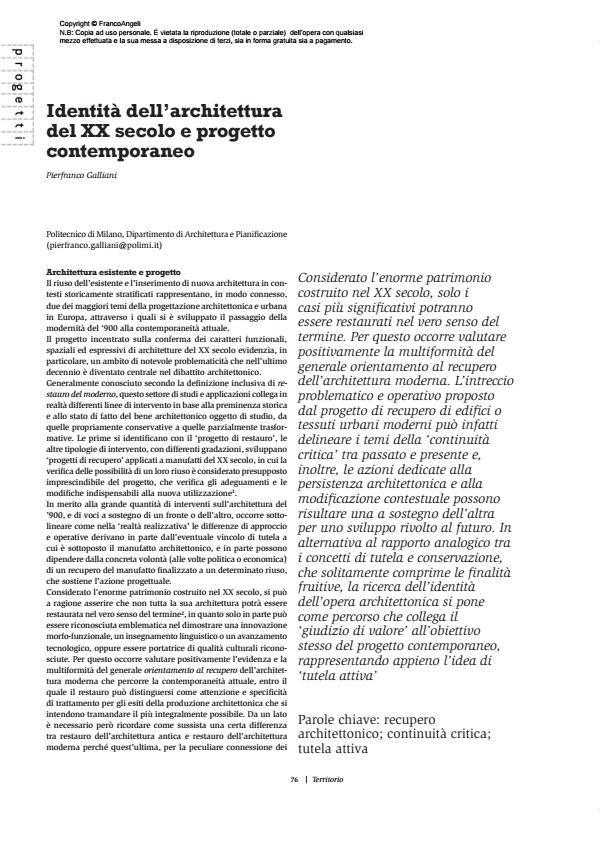Identità dell’architettura del XX secolo e progetto contemporaneo
Titolo Rivista TERRITORIO
Autori/Curatori Pierfranco Galliani
Anno di pubblicazione 2012 Fascicolo 2012/62
Lingua Italiano Numero pagine 5 P. 76-80 Dimensione file 267 KB
DOI 10.3280/TR2012-062015
Il DOI è il codice a barre della proprietà intellettuale: per saperne di più
clicca qui
Qui sotto puoi vedere in anteprima la prima pagina di questo articolo.
Se questo articolo ti interessa, lo puoi acquistare (e scaricare in formato pdf) seguendo le facili indicazioni per acquistare il download credit. Acquista Download Credits per scaricare questo Articolo in formato PDF

FrancoAngeli è membro della Publishers International Linking Association, Inc (PILA), associazione indipendente e non profit per facilitare (attraverso i servizi tecnologici implementati da CrossRef.org) l’accesso degli studiosi ai contenuti digitali nelle pubblicazioni professionali e scientifiche.
Considering the enormous amount of the architecture built in the 20th century, only the most significant instances will be able to be restored in the true sense of the term. To do this a positive assessment must be made of the many forms of the general orientation towards the restoration of modern architecture. The difficult and operational relationship proposed by the design of restoration for buildings or modern urban fabrics can in fact highlight the issues of the ‘critical continuity’ between the past and the present and also the actions designed to maintain architecture and to modify contexts may constitute supports for each other for development which looks to the future. As an alternative to the analogical relationship between the concepts of protection and conservation which usually compress use objectives, the search for the identity of a work of architecture is a path which connects ‘value judgements’ with the objective of contemporary design itself, fully representing the idea of ‘active protection’.
Parole chiave:Architectural restoration; critical continuity; active protection
- Ri-abitare il Novecento: un'idea di ‘tutela attiva' per la residenza popolare razionalista Pierfranco Galliani, in TERRITORIO 71/2015 pp.69
DOI: 10.3280/TR2014-071010 - Architettura industriale moderna: evoluzione degli approcci e consapevolezze per il riuso Pierfranco Galliani, in TERRITORIO 89/2019 pp.24
DOI: 10.3280/TR2019-089003 - Edifici pubblici del costruttivismo maturo come strumento dell'ideologia collettivistica Maria Mikaelyan, in TERRITORIO 101/2023 pp.62
DOI: 10.3280/TR2022-101007
Pierfranco Galliani, Identità dell’architettura del XX secolo e progetto contemporaneo in "TERRITORIO" 62/2012, pp 76-80, DOI: 10.3280/TR2012-062015